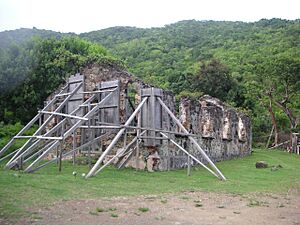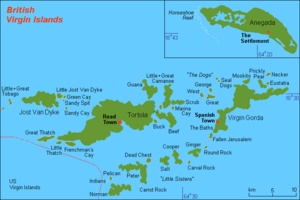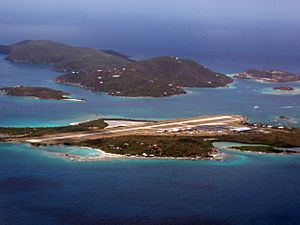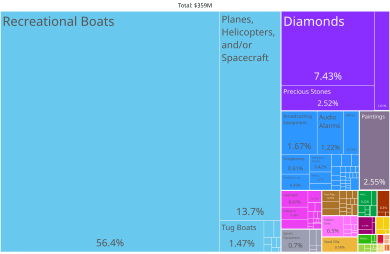British Virgin Islands facts for kids
Quick facts for kids
Virgin Islands
|
|||
|---|---|---|---|
|
|||
| Motto(s): | |||
| Anthem: "God Save the King"
|
|||
| Territorial song: "Oh, Beautiful Virgin Islands" | |||
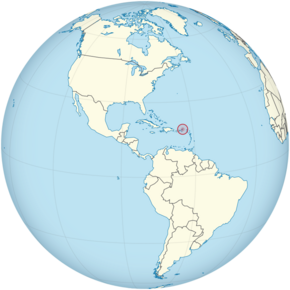
Location of British Virgin Islands (circled in red)
|
|||
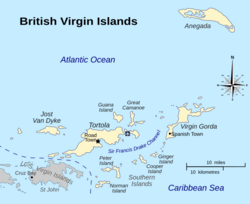 |
|||
| Sovereign state | |||
| Before annexation | Dutch West Indies | ||
| British capture | 1672 | ||
| Separate colony | 1960 | ||
| Autonomy | 1967 | ||
| Capital and largest city
|
Road Town 18°25′53″N 64°37′23″W / 18.43139°N 64.62306°W |
||
| Official languages | English | ||
| Ethnic groups
(2010)
|
76.9% Black 5.6% Hispanic 5.4% White 5.4% Mixed 2.1% Indian 4.6% other |
||
| Demonym(s) |
|
||
| Government | Parliamentary dependency under a constitutional monarchy | ||
|
• Monarch
|
Charles III | ||
|
• Governor
|
Daniel Pruce | ||
|
• Deputy Governor
|
David Archer | ||
|
• Premier
|
Natalio Wheatley | ||
| Legislature | House of Assembly | ||
| Area | |||
|
• Total
|
153 km2 (59 sq mi) | ||
|
• Water (%)
|
1.6 | ||
| Highest elevation | 521 m (1,709 ft) | ||
| Population | |||
|
• 2019 estimate
|
30,030 (222nd) | ||
|
• 2010 census
|
28,054 | ||
|
• Density
|
260/km2 (673.4/sq mi) (68th) | ||
| GDP (PPP) | 2017 estimate | ||
|
• Total
|
$500 million | ||
|
• Per capita
|
$34,200 | ||
| Currency | United States dollar (US$) (USD) | ||
| Time zone | UTC-4:00 (AST) | ||
| Date format | dd/mm/yyyy | ||
| Driving side | left | ||
| Calling code | +1-284 | ||
| UK postcode |
VG-11xx
|
||
| ISO 3166 code | VG | ||
| Internet TLD | .vg | ||
| Website | https://gov.vg/ | ||
The British Virgin Islands (BVI), officially called the Virgin Islands, is a British Overseas Territory. It is located in the Caribbean, east of Puerto Rico and the U.S. Virgin Islands. These islands are part of the Virgin Islands archipelago and the Lesser Antilles.
The British Virgin Islands include four main islands: Tortola, Virgin Gorda, Anegada, and Jost Van Dyke. There are also more than 50 smaller islands and cays. About 16 of these islands have people living on them. The capital city, Road Town, is on Tortola. Tortola is the largest island, about 20 km (12 mi) long and 5 km (3 mi) wide. In 2010, about 28,054 people lived in the British Virgin Islands. Most of them (23,491) lived on Tortola.
People from the British Virgin Islands are British Overseas Territories citizens. Since 2002, they are also British citizens.
Contents
Why "British" Virgin Islands?
The official name of the territory is "Virgin Islands." However, the word "British" is often added. This helps to tell them apart from the nearby American territory. The American islands changed their name to "Virgin Islands of the United States" in 1917.
Some local historians say the name "British Virgin Islands" was used even before 1917. Government papers and passports still use "Virgin Islands." But many groups, like the BVI Tourist Board, use "British Virgin Islands" or "BVI." In 1968, the British Government asked for "British Virgin Islands" to be used on postage stamps. This was likely to avoid confusion after the islands started using the US dollar in 1959.
History of the Islands
The Arawak people from South America were the first to settle the Virgin Islands around 100 BC. They lived there until the 15th century. Then, the Island Caribs, a more aggressive tribe, took over. The Caribbean Sea is named after them.
Christopher Columbus was the first European to see the Virgin Islands in 1493. He named them Santa Ursula y las Once Mil Vírgenes, which means "Saint Ursula and her 11,000 Virgins." This name was later shortened to Las Vírgenes (The Virgins).
In the early 1500s, Spain claimed the islands but never settled them. Over the years, England, the Netherlands, France, Spain, and Denmark all tried to control the area. It became a popular spot for pirates. There were no native people left in the British Virgin Islands during this time.
The Dutch set up a permanent settlement on Tortola in 1648. In 1672, the English took Tortola from the Dutch. They also took Anegada and Virgin Gorda in 1680. At the same time, the Danish took control of nearby islands like Saint Thomas and Saint Croix.
The British islands were important for their location. They started growing sugar cane, which became their main crop. People were brought from Africa to work as slaves on these plantations. The islands did well until the mid-1800s. Then, slavery was ended, hurricanes caused damage, and sugar beet farming grew in Europe. These things greatly reduced sugar cane production and led to harder economic times.
In 1917, the United States bought St. John, St. Thomas, and St. Croix from Denmark. They renamed them the United States Virgin Islands.
The British Virgin Islands were managed by the British government. They became a separate colony in 1960 and gained more self-rule in 1967. Since the 1960s, the islands have focused on tourism and financial services. This has made them one of the richest areas in the Caribbean.
Geography of the Islands
The British Virgin Islands are made up of about 60 tropical Caribbean islands. They range in size from Tortola, which is 20 km (12 mi) long, to tiny uninhabited islets. The total land area is about 150 square kilometers (58 sq mi). They are located a few miles east of the U.S. Virgin Islands. The North Atlantic Ocean is to the north, and the Caribbean Sea is to the south.
Most of the islands are volcanic and have hilly land. Anegada is different. It is a flat island made of limestone and coral.
Besides the four main islands (Tortola, Virgin Gorda, Anegada, and Jost Van Dyke), other islands include:
- Beef Island (connected to Tortola)
- Cooper Island
- Ginger Island
- Great Camanoe
- Great Thatch
- Guana Island
- Little Thatch
- Mosquito Island
- Necker Island
- Norman Island
- Peter Island
- Salt Island
- Prickly Pear
- Eustatia
- Saba Rock
- Frenchman's Cay (connected to Tortola)
- Nanny Cay (connected to Tortola)
- Scrub Island
- Sandy Cay
- Green Cay
- Sandy Spit
- Little Jost Van Dyke
- Great Tobago
- Little Tobago
- Dog Islands
Climate and Weather
The British Virgin Islands have a tropical climate. This means it's warm all year round. Trade winds help to keep the temperatures comfortable. In Road Town, the capital, temperatures are usually around 32°C (90°F) in summer and 29°C (84°F) in winter. Night temperatures are around 24°C (75°F) in summer and 21°C (70°F) in winter.
The islands get about 1150 mm (45 inches) of rain each year. It rains more in the hills and less near the coast. The wettest months are usually September to November. The driest months are February and March. Hurricanes can sometimes hit the islands. The hurricane season runs from June to November.
Getting Around the Islands
There are 113 km (70 mi) of roads on the islands. The main airport is Terrance B. Lettsome International Airport. It is on Beef Island, which is connected to Tortola by the Queen Elizabeth II Bridge. There are also smaller airports on Virgin Gorda and Anegada. Private planes and helicopters can fly to the islands too.
The main port is in Road Town. Ferries travel between the British Virgin Islands and to the nearby United States Virgin Islands. Cars in the British Virgin Islands drive on the left side of the road. However, most cars have the steering wheel on the left, because they come from the United States. The roads can be steep, narrow, and winding.
People of the British Virgin Islands
In 2010, the population of the British Virgin Islands was 28,054. Today, it is estimated to be around 35,800 people. Most of the people (76.9%) are Afro-Caribbean. They are descendants of slaves brought to the islands by the British. Other groups include Latinos (5.6%), people of European background (5.4%), and those of Mixed ancestry (5.4%). About 2.1% are of Indian descent.
Many people living in the British Virgin Islands were born in other countries. In 2010, about 39.1% of residents were born locally. Other large groups came from Guyana (7.2%), St. Vincent and the Grenadines (7.0%), Jamaica (6.0%), the United States (5.5%), and the Dominican Republic (5.4%). The islands rely a lot on workers from other countries.
Religion
Most people in the British Virgin Islands are Christian. In 2010, over 90% of the population said they were Christian. The largest Christian groups include Methodists (17.6%), Church of God (10.4%), Anglicans (9.5%), and Roman Catholics (8.9%). The country's Constitution starts by stating a national belief in God. There are also smaller groups of Hindus and Muslims.
Culture
Language
The main language spoken in the British Virgin Islands is English. There is also a local dialect. Spanish is spoken by immigrants from places like Puerto Rico and the Dominican Republic.
Music
The traditional music of the British Virgin Islands is called fungi. It's named after a local cornmeal dish. Fungi music has a special sound because it mixes African and European music styles. It tells local stories and traditions, so it's an important part of the islands' culture. Fungi bands, also called "scratch bands," use instruments like calabash, washboards, bongos, and ukulele. They also use traditional instruments like keyboards, guitars, and saxophones. Fungi music is for dancing and often includes funny social comments.
Literature
There are many talented writers from the Virgin Islands. Some well-known names include Alphaeus Osario Norman, Verna Penn Moll, Jennie Wheatley, and Patricia G. Turnbull. Their poems and those of other writers can be found in a book called Where I See the Sun – Contemporary Poetry in The Virgin Islands.
Economy and Jobs
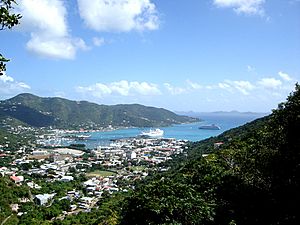
The economy of the British Virgin Islands relies on two main things: financial services and tourism. Financial services make up about 60% of the economy. Tourism makes up about 40-45%. Tourism is very important because it provides many jobs for local people. Many businesses in tourism are owned by locals, like taxi drivers and street vendors.
Financial services are even more important for the government's money. Over half of the government's income comes from fees paid by offshore companies. More money also comes from taxes on salaries in the financial industry.
The official money used in the British Virgin Islands is the United States dollar (US$). It has been used since 1959. The British Virgin Islands has one of the richest economies in the Caribbean. The average income per person was about $42,300 in 2010.
Tourism
Tourism brings in about 45% of the country's income. The islands are a popular place for visitors from the US. Tourists enjoy the white sand beaches, like The Baths on Virgin Gorda. They also like to snorkel around the coral reefs near Anegada. The bars on Jost Van Dyke are also well-known.
The BVI is famous for sailing. Many people rent sailboats to visit islands that are harder to reach. The BVI Spring Regatta and Sailing Festival, which started in 1972, is a big event. Many tourists also come on cruise ships. Even though they spend less money per person, cruise ship visitors are important for taxi drivers. Only people from the Virgin Islands can work as taxi drivers.
Financial Services
Financial services make up more than half of the islands' income. This money mostly comes from licensing "offshore companies." The British Virgin Islands is a major global center for these services. In 2000, a report said that over 45% of the world's offshore companies were set up in the British Virgin Islands. Since 2001, the British Virgin Islands Financial Services Commission has regulated these services.
Citco is a large company based in the British Virgin Islands. It helps manage money for many hedge funds around the world.
The British Virgin Islands is sometimes called a "tax haven." This is because it has a system that allows companies to pay less tax. However, the government has worked to make its tax systems more open. In 2013, British Prime Minister David Cameron said that it was no longer fair to call the British Overseas Territories "tax havens."
Farming and Industry
Farming and industry are a small part of the islands' economy. Farmers grow fruits, vegetables, and sugar cane. They also raise animals like livestock and poultry. Industries include making rum, construction, and building boats. Fishing is also done in the waters around the islands.
Workers
The British Virgin Islands relies heavily on workers from other countries. More than half of all workers on the islands are from outside the territory. Only about 37% of the people living there were born on the islands. Most workers (about 59.4%) work in the service industry. A very small number (less than 0.6%) work in farming.
Education
The British Virgin Islands has several government and private schools. There is also a college called H. Lavity Stoutt Community College on Tortola. It is named after Lavity Stoutt, who was the first Chief Minister of the British Virgin Islands. Many students from the British Virgin Islands go overseas for college. They often go to the University of the West Indies, or to universities in the United Kingdom, United States, or Canada.
Most people in the British Virgin Islands can read and write. The literacy rate is very high, at 98%. There is also a branch of the University of the West Indies in the territory.
Images for kids
See also
 In Spanish: Islas Vírgenes Británicas para niños
In Spanish: Islas Vírgenes Británicas para niños
 | John T. Biggers |
 | Thomas Blackshear |
 | Mark Bradford |
 | Beverly Buchanan |




